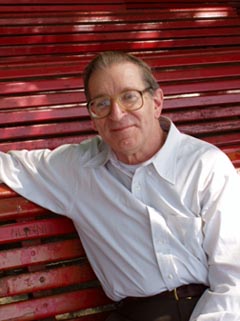Dr. Dennis G. Peters

|
|
Born in Los Angeles, California on April 17, 1937, Professor Peters received the B.S. degree (cum laude) from the California Institute of Technology in 1958 (where he did undergraduate research for three years under the direction of Professor Ernest H. Swift) and the Ph.D. degree from Harvard University in 1962 (with the mentorship of Professor James J. Lingane).
Beginning his appointment at Indiana University as an Instructor in 1962, Professor Peters became the Herman T. Briscoe Professor of Chemistry in 1975.
Professor Peters is a member of the American Chemical Society, the Electrochemical Society, the Society for Electroanalytical Chemistry, and the International Society of Electrochemistry. For the Electrochemical Society, he is a member of the executive committee of the division of Organic and Biological Electrochemistry and has served as Secretary-Treasurer, Vice Chairman, and Chairman of that division.
Professor Peters received the Ulysses G. Weatherly Award for distinguished teaching at Indiana University in 1969, and a distinguished teaching award from the College of Arts and Sciences-Graduate School Alumni Association in 1984. He presented approximately 35 lectures in analytical chemistry during a two-month period in 1975 at the University of Natal in Pietermaritzburg, South Africa under the sponsorship of the Students' Visiting Lecturers Trust Fund. For two months in 1980, he was a Visiting Fellow of the Japan Society for the Promotion of Science, during which time he gave research lectures on electroorganic chemistry at 13 universities throughout Japan. In 1988 he received a Chemical Manufacturers Association National Catalyst Award for outstanding teaching, and in 1990 he was recipient of the American Chemical Society Division of Analytical Chemistry Award for Excellence in Teaching. In 1995 and 2000, he received an outstanding teaching award from the Indiana University chapter of Alpha Lambda Delta.
In 1997, 1999, and 2000, he received Teaching Excellence Recognition Awards from the Indiana University Board of Trustees. In 2001, he received the James Flack Norris Award for Outstanding Achievement in the Teaching of Chemistry from the Northeastern Section of the American Chemical Society. For 2002, Dr. Peters was the recipient of the Brown Derby Award, presented to an Outstanding and Popular Faculty Member by the Indiana University School of Professional Journalists, and he received the Henry B. Linford Award for Distinguished Teaching, presented by The Electrochemical Society. The year 2002 also marked Dr. Peters' 40th year of teaching at Indiana University, and an undergraduate scholarship fund has been created in his honor. In 2003, 2005, 2007, and 2010, he received Trustees Teaching Awards from Indiana University. From Indiana University he received a Distinguished Service Award in 2005 and the W. George Pinnell Award for Outstanding Service in 2006. In 2007, Dr. Peters was elected as a Fellow of The Electrochemical Society, and he was the 2012 recipient of the Manuel M. Baizer Award in Organic Electrochemistry from The Electrochemical Society.
Professor Peters is coauthor of five textbooks on analytical chemistry (published by W. B. Saunders Company): Quantitative Chemical Analysis, third edition, 1968 (with R. B. Fischer); A Brief Introduction to Quantitative Chemical Analysis, 1969 (with R. B. Fischer); Chemical Equilibrium, 1970 (with R. B. Fischer); Chemical Separations and Measurements, 1974 (with J. M. Hayes and G. M. Hieftje); and A Brief Introduction to Modern Chemical Analysis, 1976 (with J. M. Hayes and G. M. Hieftje).
Over the past 40 years, Professor Peters' research, more of which is described elsewhere, has focused principally on the electrochemical behavior of halogenated organic compounds, especially alkyl halides, acetylenic halides, and acyl halides. More recently, he and his group have been investigating the use of transition-metal complexes as homogeneous-phase and polymer-bound catalysts for the reduction and oxidation of organic species.

